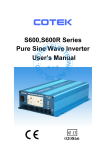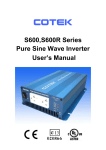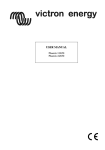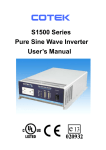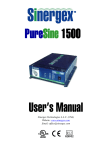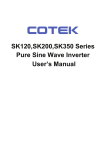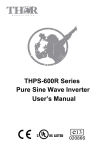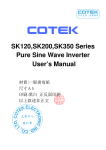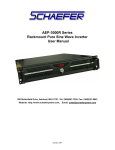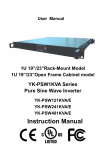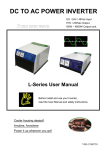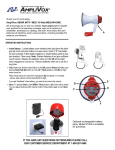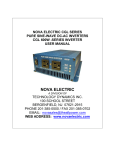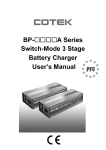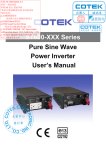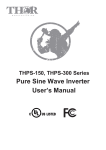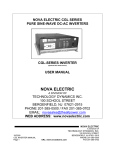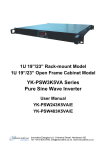Download Cotek S600 Manual
Transcript
S600,S600R Series Pure Sine Wave Inverter User’s Manual Table of contents 1. Important Safety Information.……………………………………………… 1 1-1 General Safety Precautions…………………………………………… 1 1-2 Batteries Precautions………………………………………………….. 1 2. Features………………………………………………………………………... 2 2-1 Applications.……………………………………………………………. 2 2-2 Electrical Performance………………………………………………… 3 2-3 Mechanical Drawings………………………………………………….. 4 3. Instructions………………………………………………….………………… 5 3-1 Front Panel Operation..………………………………………………... 5~6 3-2 Rear Panel Operation..………………………………………………… 7~8 3-3 Installation………………………………………………………………. 9 3-4 Quick hook – up and Testing.………………………………………... 10~11 3-5 AC Safety Grounding………………………………………………….. 12~13 3-6 DC Wiring Connections…………………….…………………………. 13~14 3-7 Inverter Operation……………………………………………………… 15 4. Troubleshooting……….……………………………………………………… 16 5. Maintenance…………………………………………………………………… 17 6. Warranty……………………………………………………………………….. 17 7. Appendices……………………………………………………………………. 18 7-1 CE (LVD EN60950-1) Declaration of Conformity…………………... 18 7-2 FCC (Class B) Declaration of Conformity…………………………… 19 7-3 e-mark (e13 020866) Declaration of Conformity…………………… 20~21 7-4 UL (UL458) Notice of Completion…………………..……………….. 22 ©Copyright :This manual is the copyright of COTEK Electronic lnd. Co., Ltd. And may not be reproduced or copied without the express permission of the owner. A0-R603-30001 1 1. Important Safety Information WARNING! Before installing and using the Inverter, you need to read Following safety information carefully. 1-1. General Safety Precautions 1-1-1. Do not expose the Inverter to water, mist, snow, or dust. To reduce the risk of hazard, do not cover or obstruct the ventilation shaft. Do not install the Inverter in a zero-clearance compartment. Overheating may occur. 1-1-2. To avoid the risk of fire and electronic shock, make sure that existing wiring is in good electrical condition and not undersize. Do not operate the Inverter with damaged or substandard Wiring. 1-1-3. There are some components in the inverter can cause arcs and sparks. To prevent from fire or explosion, do not put batteries, flammable materials, or anything should be ignition–protected around the inverter. 1-2. Precautions When Working with Batteries 1-2-1. If battery acid contacts your skin or clothing, you need to wash it out immediately with soap and water. If acid enters into your eyes, immediately flush your eyes with running cold water for at least 20 minutes and get medical attention immediately. 1-2-2. Never smoke or make a spark or flame in the vicinity of batteries or Engines. 1-2-3. Do not drop a metal tools on the battery. The resulting spark or shortcircuit on the battery or other electrical parts may cause an explosion. 1-2-4. Remove personal metal items such as rings, bracelets, necklaces, and watches when working with a lead-acid battery, A lead-acid battery may produce a short-circuit current who’s temperature is high enough to weld these metal items and cause a severe burn. 1 2. Features Pure sine wave output (THD < 3%) Output frequency:50 / 60Hz switch selections Input & output fully isolated design High efficiency 88~94% Driving highly reactive & capacitive load at start moment. Tri-Color indicators show input voltage & output load level Loading controlled cooling fan Advanced microprocessor Protection:Input low voltage Low battery alarm Overload Short circuit Input over voltage Over temperature 2-1. Applications 2-1-1. Power tools – circular saws, drills, grinders, sanders, buffers, weed and hedge trimmers, air compressors, etc. 2-1-2. Office equipment – computers, printers, monitors, facsimile machines, and scanners, etc. 2-1-3. Household appliances – vacuum cleaners, fans, fluorescent and incandescent lights, shavers, sewing machines, etc. 2-1-4. Kitchen appliances – microwave ovens, refrigerators and freezers, coffee makers, blenders, ice makers, toasters, etc. 2-1-5. Industrial equipment – metal halide lamp, high – pressure sodium lamp, etc. 2-1-6. Home entertainment electronics – television, VCRs, video games, stereos, musical instruments, satellite equipment, etc. 2 2-2. Electrical Performance Specification Model No. Item S600-112 S600-124 S600-148 S600-212 S600-224 S600-248 Continuous Output Power 600W Maximum Output Power (Max) 680W±2% Surge Rating(Max) 800W Input voltage Output Voltage 12V 24V 48V 100 / 110 / 120V Frequency 12V +/- 3% 220 / 230 / 240V 50 / 60Hz (Switch Selections) 24V 48V +/- 3% +/- 0.05% Efficiency (full load) Max 87.0% 90.0% 92.0% 90.0% 93.0% 94.0% No Load Current Draw (Max) 0.87A 0.43A 0.23A 0.83A 0.43A 0.22A Output Waveform Pure Sine Wave ( THD < 3% ) Output voltage Regulation 100 / 110 / 120V RMS -10%/+4% 220 / 230 / 240V RMS -10%/+4% Input Voltage Regulation 10.5-15 21.0-30 42-60 10.5-15 21.0-30 42-60 VDC VDC VDC VDC VDC VDC Input Level Indicator Red / Orange / Green LED Load Level Indicator Failure Indicator Protection Red LED Overload, Short Circuit, Reverse Polarity (Fuse), Over / Under Input Voltage, Over Temperature. Safety Certification UL458 EMC FCC Class B Operating Temperature Range 0 - 33 ℃ EN60950-1 EN50081-1: 1992 EN50082-1: 1992 e-mark EN55022B: 1994 EN61000-4-2: 1995 e13-020866 EN61000-4-3: 1996 ENV50204: 1995 0 - 40 ℃ Storage Temperature Range -30℃ to 70℃ Cooling Loading controlled cooling fan Dimensions 295(L) x 180(w) x 72(H) mm / 11.61(L) x 7.09(W) x 2.83(H) Inch Weight 2.7 kgs. / 5.4 Lbs. Note: The specification are subject to change without notice. 3 2-3. Mechanical Drawing 4 3. Instructions This power inverter series is one of the most advanced line of mobile AC power systems. To get the most effective power inverter, it must be installed and used properly. Please read the instructions of this manual before you install and operate this model. 3-1. Front Panel Operation: 3-1-1. Front view: P U R E S IN E W A V E IN V E R T E R 3-1-2. ON / OFF switch: Leave the switch in the down position (OFF) during installation. 3-1-3. Input Level:Display Input Voltage LED Status DC 12V DC 24V DC 48V Slow Red Blink 10.5~10.9 21.0~21.8 42.0~43.6 Red 10.9~11.3 21.8~22.6 43.6~45.2 Orange 11.3~12.0 22.6~24.0 45.2~48.0 Green 12.0~14.0 24.0~28.0 48.0~56.0 Orange Blink 14.0~14.7 28.0~29.4 56.0~58.8 Over Red Blink 14.7q 29.4q 58.8q Note: The specification are subject to change without notice. 5 3-1-4. Load Level:Display AC Load Watts LED Status Load Condition Dark 0 ~ 30W Green 30W ~ 200W Orange 200W ~ 450W Red 450W ~ 580W Red Blink Over 580W 3-1-5. Failure:Display failure status OVP:over voltage protection UVP:under voltage protection OTP:over temperature protection OLP:over load protection 3-1-6. AC outlet (Outlet Sockets available): North America (GFCI) North America Continental Europe (SCHUKO) Australia / New Zealand United Kingdom 6 3-2. Rear Panel Operation: DC INPUT WARNING: REVERSE POLARITY WILL DAMAGE UNIT NEG(-) POS(+) CHASSIS GROUND DC INPUT WARNING: REVERSE POLARITY REMOTE PORT WILL DAMAGE UNIT NEG(-) POS(+) CHASSIS GROUND 3-2-1. Remote ON / OFF switch for S600R model only. 3-2-1-1. To operate the inverter with Remote ON / OFF switch, ON / OFF switch on the Front Panel should be off 3-2-1-2. Ensure the remote control contact is off. 3-2-1-3. Use 14 ~ 20 AWG wire to connect the Rear Panel Terminal marked “REMOTE PORT” to the remote control contact. If the remote control contact is in a state of low impedance (short), the inverter will be turned ON. If the remote control contact is in a state of high impedance (open), the inverter will be turned OFF. 7 3-2-2. Ventilation Shaft: Be sure to keep it a distance (at least 1 inch) form surrounding things. 3-2-3. Input terminals: Connect the input terminal to 12V / 24V / 48V battery or other 12V / 24V /48V power source. 【+】represents positive, and【-】represents negative. Reverse polarity connection will blow the internal fuse and may damage the inverter permanently. 3-2-4. Use wire #8 AWG to connects Chassis ground with Vehicle Chassis. WARNING! Operating the inverter without a proper ground connection may cause an electrical safety hazard. 8 3-3. Installation: The power inverter should be installed in an environment that meets the following requirements: 3-3-1. Dry – Do not allow water to drip on or enter into the inverter. 3-3-2. Cool – Ambient air temperature should be between 0℃ and 33℃, the cooler the better. 3-3-3. Safe – Do not install the inverter in a battery compartment or other areas where flammable fumes may exist, such as fuel storage areas or engine compartments. 3-3-4. Ventilated – Keep the inverter a distance (at least one inch) away from surrounding things. Ensure the ventilation shafts on the rear and the bottom of the unit are not obstructed. 3-3-5. Dust free – Do not install the Inverter in dusty environment. The dust can be inhaled into the unit when the cooling fan is working. 3-3-6. Close to batteries – Avoid excessive cable lengths. Do not install the Inverter in the same compartment as batteries. Use the recommended wire lengths and sizes (see section 3-6). Do not mount the inverter where it will be exposed to the gases produced by the battery. These gases are very corrosive, and prolonged exposure will damage the Inverter. WARNING! Shock Hazard. Before proceeding further, carefully check that the Inverter is NOT connected to any batteries, and that all wiring is disconnected from any electrical sources. Do not connect the output terminals of the Inverter to an incoming AC source. 9 3-4. Quick hook – up and testing: For a quick hook – up of the power inverter to check its performance before going ahead with installation, please follow these guidelines: 3-4-1. To check its performance, unpack and inspect the power inverter the switch is OFF. 3-4-2. Connect the cables to the power input terminals on the rear panel of power inverter. The red terminal represents positive (+) and black terminal represents negative (-). Insert the cables into the terminals and clamp the nuts and the wires securely. WARNING! You may observe a spark when you make this connection since current may flow into charge capacitors in the power inverter. Do not make this connection with the flammable fumes close by. Explosion or fire may occur. WARNING! Ensure all the DC connections are tight (torque to 9 10) ft-lbs, 11.7 – 13 Nm. Loose connections and overheat may result in a potential hazard. 10 3-4-3. Before proceeding further, carefully check that cable you have connected does tie negative terminal of inverter to the negative output power source. CAUTION ! Reverse polarity connection will blow the fuse in inverter and may permanently damage the inverter. Damage caused by reverse polarity connection is not covered by warranty. 3-4-4. Connect the cable from the negative terminal of the inverter to the negative terminal of the power source. Make a secure connection. 3-4-5. Set the power switch to the “ON” position and the buzzer will send out beep sound at the moment the inverter will make self-diagnosis and the LED’s indicators will also appear various colors. Finally the buzzer will send out another beep sound and the input Level LED indicators will turn to “Green” color and the inverter starts working successfully. 3-4-6. Set the power switch to OFF position, the inverter stops and all the lights go Off. 3-4-7. Set power inverter switch to the ON position and turn the test load on. The inverter should supply power to the load. If you plan to accurately measure the true output r.m.s. voltage of inverter, a meter such as FLUKE 45 BECKMAN 4410 or TRIPLETT 4200 must be used. 11 3-5. AC Safety Grounding: During the AC wiring installation, AC input and output ground wires are connected to the inverter. The AC input ground wire must be connected to the incoming ground from AC utility source. The AC output ground wire should go to the grounding point for your loads ( for example, a distribution panel ground bus ). 3-5-1. Neutral Grounding (GFCI’S): 3-5-1-1. 120V models:The neutral conductor of the AC output circuit of the Inverter is automatically connected to the safety ground during inverter operation. This conforms to National Electrical Code requirements that separately derived from AC sources (such as inverters and generators) which have their neutral conductors tied to ground in the same way as the neutral conductors from the utility tied to ground at the AC breaker panel. For models configured with a transfer relay, while AC utility power is present and the Inverter is in bypass mode, this connection (the neutral of the Inverter’s AC output to input safety ground) is not present so that the utility neutral is only connected to ground at your breaker panel, as required. WARNING! The risk of electronic shock. Use only pass and Seymour type 2091-W, ground fault circuit-interrupter receptacles. Other types may fail to operate properly when connected to this inverter equipment. 3-5-1-2. 230V models:There is no connection made inside the Inverter from either the line or neutral conductor to safety ground. 12 Ground Fault Circuit Interrupters (GFCI): Installations in Recreational Vehicles (for North American approvals) will require GFCI protection of all branch circuit connected to the AC output of the hardwire terminal equipped with Inverter. In addition, electrical codes require GFCI protection of certain receptacles in residential installations. While the pure sine wave output of the Inverter is equivalent to the waveform provided by utilities, compliance with UL standards requires us to test and recommend specific GFCI. Cotek has tested the following GFCI – protected 20A receptacles and found that they functioned properly when connected to the output of the Inverter. WARNING! Do not operate the power inverter without connecting it to ground. Electrical shock hazard may occur. 3-6. DC Wiring Connections: Follow this procedure to connect the battery cables to the DC input terminals on the Inverter. The cables should be as short as possible (less than 10 feet / 3 meters ideally) and large enough to handle the required current in accordance with the electrical codes or regulations applicable to the installation. Cables that are not an adequate gauge (too narrow) or too long will deteriorate inverter performance such as poor surge capability and frequent low-input voltage warnings and shutdowns. These low input voltage warnings are due to DC voltage drop across the cables from the inverter to the batteries. The linger and narrower the cables, the greater the voltage drops. WARNING! The fuse must be installed on positive cable. Failure to place a fuse on “+” cables running between the inverter and battery may cause damage to the inverter and will void warranty. 13 Increasing DC cable size helps improve the situation. Cotek recommends the following cables for optimum inverter performance. (apply both 120V and 230V versions) Model No Wire AWG Inline Fuse S600-112 #4 100A S600-212 #4 100A S600-124 #6 50A S600-224 #6 50A Also, use only high quality copper wiring and keep cable length short, (a maximum of 3-6 feet). S60 0 INLINE FUSE - + BATTERY 14 3-7. Inverter Operation: To operate the power inverter, use the ON / OFF switch on the Front panel to turn the power on. Then the power inverter is ready to deliver AC power to the loads. If you are operating several loads from the power inverter, turn them on separately after the inverter is on. This will ensure that the power inverter does not have to deliver the starting currents for all the loads at one time. 3-7-1. Controls and indicators: The ON / OFF switch turns the control circuit in the power inverter on and off. It does not disconnect power from the power inverter. The Inverter operates from an input voltage ranging of: 10.5 to 15.0 VDC for 12V models 21.0 to 30.0 VDC for 24V models 42.0 to 60.0 VDC for 48V models The Inverter will indicate high and low DC voltage conditions as follows: 15 Model Dc Input over Voltage shut-down Dc Input under Voltage alarm Dc Input under Voltage shut-down S600-112 S600-212 15.3 11.0 10.5 S600-124 S600-224 30.6 22.0 21.0 S600-148 S600-248 61.2 44.0 42.0 4. Troubleshooting: WARNING! Do not open or disassemble the S600 Inverter. Attempting to service the unit yourself may cause an electrical shock or fire. Problems and Symptoms Possible Cause Solutions Low output voltage Using average reading Use true RMS reading meter and cable. (110V:195-105VAC, Voltmeter. (220V:190-210VAC) See page 11 3-4-7. of the manual Load LED bar flash. Overload Reduce load. No output voltage Low input voltage. Recharge battery, Voltage indicator In the lower red zone No output voltage. Over Temp indicator on check connections and cables. Thermal shutdown Improve ventilation, make sure ventilation shafts of the inverter are not obstructed. Lower ambient temperature. Short circuit or Wiring error. Check AC wiring for short circuit or improper polarity (hot and neutral reversed). Remove load. Load less than 600W No output voltage Overload indicator on Very high power load 16 5. Maintenance: Very little maintenance is required to keep your inverter operating properly. You should clean the exterior of the unit periodically with a damp cloth to pre vent accumulation of dust and dirt. At the same time, tighten the screws on the DC input terminals. 6. Warranty: We guarantee this product against defects in materials and workmanship for a period of 24 months from the date of purchase and will repair or replace any defective power inverters if you directly returned them to us with postage paid. Please note that Cotek is only responsible for ensuring our products are operational before delivering. This warranty will be considered void if the unit has been misused, altered, or accidentally damaged. Cotek is not liable for anything that occurs as a result of the user’s fault. 17 7-1. CE (LVD EN60950) Declaration of Conformity: 18 7-2. FCC (Class B) Declaration of Conformity: 19 7-3. e-mark (e13 020866) Declaration of Conformity: 20 7-3. e-mark (e13 020866) Declaration of Conformity: 21 7-4. UL (UL458) Notice of Completion 22 No. 33, Rong Hsin Rd., Pa Teh City, Tao Yuan County, Taiwan Phone:886-3-3661581 FAX:886-3-3676029 E-mail:[email protected] http:// www.cotek.com.tw 2005.08

























